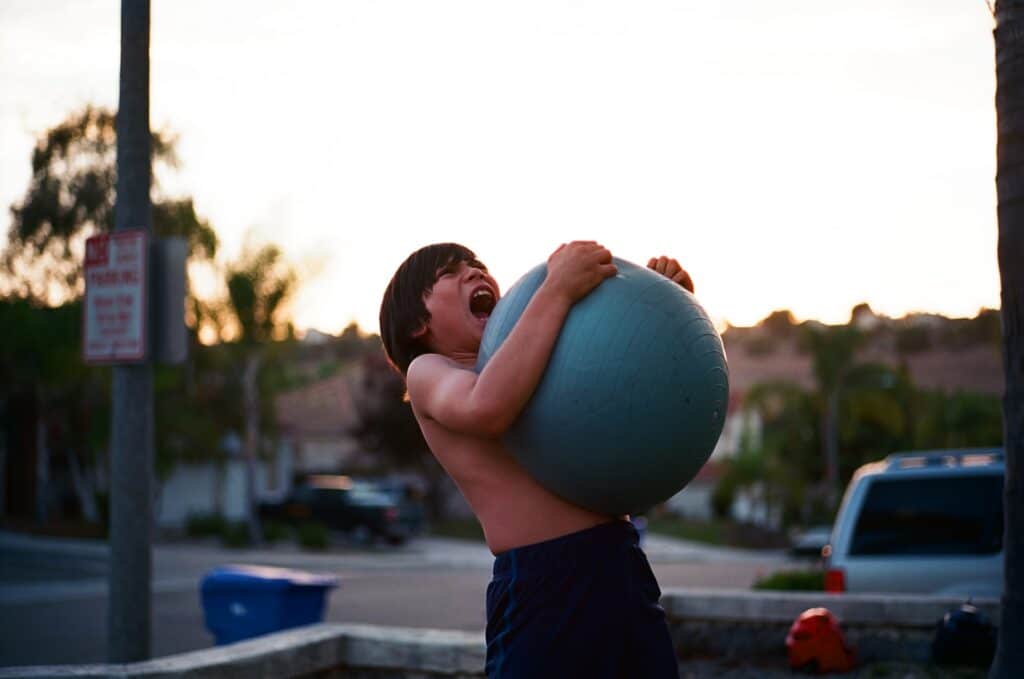Few things move me like the chainsaw rip of a blue phrase bristling with blush-inducing epithets to shock mothers into clapping the ears of all nearby children.

It’s how I was raised.
My father, God rest him, was born in Kentucky. He grew up poor, slopping hogs and fetching snapping turtles out of the local creek. At fifteen he was thrown out of high-school, having been labeled “incorrigible.” Not sure what else to do, his mother lied about his age and sent him off to the Navy. After a time he talked, unsurprisingly, like a sailor.
He came home from Korea some years later and used his military benefits to pursue a Masters Degree in English. This was in Los Angeles, right about the time my mother, a Syrian immigrant, had taken up residence with her brother in the same apartment complex.
I like to think they met in the laundry room, but I don’t know.
The point is they got to talking. Sort of.
Her English was lousy. But they eventually got married and she was eager to learn and practice.
That happened well enough, except that my father had the foulest mouth this side of Appalachia. Mom learned to cuss pretty well, but without a strong sense of the deeper meanings of the profane language, she was far less discreet in her use. This was a problem. And she was often nonsensical in how she would string things together. The words would lose their power in such cases. They were just sloppy noise.
That’s bad cussing.
My father was different. He had talent. He eventually became a professor of English and he used to say, “There are no such things as bad words. Only words used badly.”
Cussing was an art form in my house and that’s why I found this 2017 article in the New York Times so validating.
As children we’re taught that cursing, even when we’re in pain, is inappropriate, betrays a limited vocabulary or is somehow low class in that ambiguous way many cultural lessons suggest. But profanity serves a physiological, emotional and social purpose — and it’s effective only because it’s inappropriate.
The inappropriateness is key.
I’m a Muslim and it’s considered impermissible to use foul language, though what actually constitutes “foul” language is a point worth sorting out. Scholars have used the “culture standard” (urf) to clarify similar issues, though I’m not a scholar and I do not know if that is applicable here.
It probably doesn’t matter, because from the perspective of secular sociology, it is the socially sanctioned suppression of certain words that give them their power. Bad is what we collectively acknowledge as bad. Despite the elevation of the cuss word in my biological home to a place of magnificent oratory, our culture builds dark energy into the language through a manufactured taboo.
And that energy is powerful.
In a 2009 study, it was found that swearing increased ones tolerance to pain. The study was pretty simple. Submerge your arm in a bucket of ice water and see how long you could keep it there while repeating certain words, either “neutral” words or “bad” words. It turns out an F-bomb mantra allows you to keep your arm in there about 50% longer than otherwise.
Using socially inappropriate language triggers a release of adrenaline, setting off the fight or flight response. I opened this blog by sharing the extent to which cussing moves me. It’s a real thing. It’s chemical, and research suggests that cussing can even trigger the release of agents that will boost physical performance.

Interestingly, cussing is also correlated with higher levels of honesty and a greater command of language in general.
I am in a relationship with my faith. I am called to balance my impulses as a physical creature against my aspiration to transition from my physical life gracefully. It’s something that many believing people struggle with. I have no personal problem with cussing, but how I feel about things is secondary to the moral and religious system that I have adopted. Does the cultural standard outweigh my father’s tongue?
Perhaps, and I may have to choose between the power of profanity and the promise of growth through compromise. But the good news is that some of the benefits of cussing remain accessible, even to the fresh-mouthed saints among us:
In social settings, swearing can serve as a connector. Every generation has its own slang, which includes profanity. When you use that language, it’s almost like a password that gives you access to people hip to it . . . . This can work even if you avoid swearing . . . people with religious beliefs often avoid swearing and may use other phrases, like “shut the front door,” to replace profanity. This signals who you are socially . . . .
Well I’ll be . . .
You can read the full article here.
Leave a comment below for posterity or join us in the D&T Chautaqua Discord to discuss this post with other adventurous spirits from around the world.

Great piece.
Gym rats harness cussing power all day! I’ve heard it!
Double dag nabbit!!! Aaaaah I feel better 😃
Crappity frackk!!!!